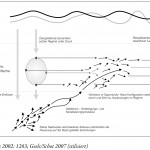Querverweis: »Tyranny of Structurelessness«?
Jan-Felix Schrape | 22. Juli 2014In der New York Times ist letztes Wochenende eine Buchbesprechung erschienen, die sich mit dem Buch »The People’s Platform: Taking Back Power and Culture in the Digital Age« (2014) der Dokumentarfilmerin Astra Taylor auseinandersetzt. Anders als z.B. Evgeny Morozov (»The Net Delusion«) verharrt Taylor dabei laut Tim Wus Rezension nicht in brachialer Kulturkritik am Social Web und seinen Kernakteuren, sondern kommt zu differenzierteren Aussagen:
»[…] at least the ancien régime felt some need to cultivate cultural institutions, and to pay for talent at all levels. Along came the web, which swept away hierarchies — as well as paychecks, leaving behind creators of all kinds only the chance to be fleetingly ›Internet famous.‹ And anyhow, she says, the web never really threatened to overthrow the old media’s upper echelons […]. Instead, it was the cultural industry’s middle classes that have been wiped out and replaced by new cultural plantations ruled over by the West Coast aggregators.«
Gemeint sind Google, Amazon, Facebook oder auch Apple, die ihr Geld als zentrale Schaltstellen der Online-Welt zu guten Teilen (mehr oder minder indirekt) mit dem kreativen Potential der Web-User verdienen. In Anlehnung an die Feministin Jo Freeman spricht die Autorin von einer neuen »tyranny of structurelessness«, in der die ›Eliten‹ des Netzes ihre eigene Machtstellung regelmäßig verleugnen können. Auch von den viralen Optionen zur Bottom-Up-Diffusion im Social Web hält Taylor ausgenscheinlich nicht viel, wie der Rezensent wie folgt zusammenfasst:
»In any event, the odds of going viral are comparable to winning the lottery, but the lottery, to its credit, actually pays out in cash. You might say virality is the promise that keeps the proletariat toiling in the cultural factories, instead of revolting and asking for something better.«
Wu hält aber auch einige Kritikpunkte an Taylors Buch bereit: Zum einen gibt er zu bedenken, dass die Einkommenschancen professioneller Künstler, Journalisten etc. nicht nur durch die genannten Konzerne, sondern auch durch die ›en passant‹-Generierung von Inhalten durch Freizeitnutzer und Amateure geschmälert werden; zum anderen hebt er hervor, dass Kultur bzw. Kulturgüter durch das Netz und seine Plattformen (angesprochen werden Amazon, Youtube und Netflix) noch nie so zugänglich waren wie heute. Taylors Grundthese – ein sukzessiver Wegfall des kulturellen Mittelbaus im Online-Kontext – hält Wu allerdings für sehr wichtig:
»›The People’s Platform‹ should be taken as a challenge by the new media that have long claimed to be improving on the old order. Can they prove they are capable of supporting a sustainable cultural ecosystem […]? […] If Google, Apple, Facebook and Amazon truly believe they’re better than the old guard, let’s see it.«














